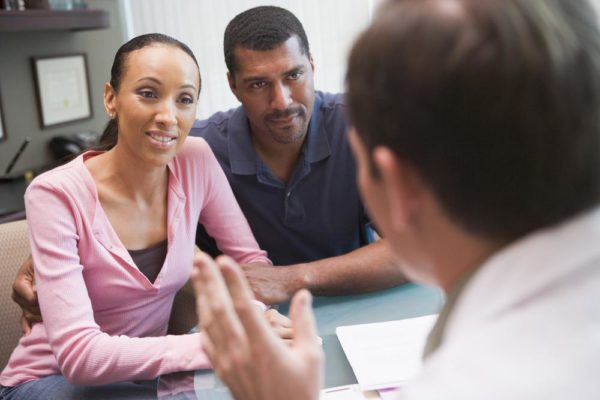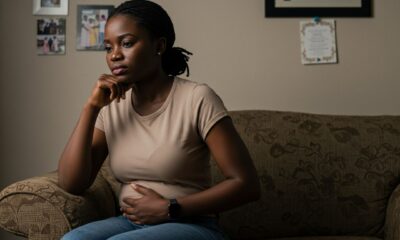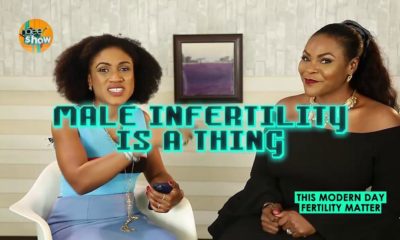Features
Nicole the Fertile Chick: Getting Your Diagnosis
 It is very rare for a couple to just walk into their Ob/Gyn’s office for a fertility examination, just because. True, there are those couples who include this as part of their pre-wedding procedure, but not only is this a small number, the vast majority of couples will take their fertility as a given…until the cold water of reality is splashed in their faces. Whether by way of your doctor delivering the bombshell or, less desirably, via a big brown envelope with your test results, the mind numbing, heart-in-your stomach, almost out-of-body experience is always the same.
It is very rare for a couple to just walk into their Ob/Gyn’s office for a fertility examination, just because. True, there are those couples who include this as part of their pre-wedding procedure, but not only is this a small number, the vast majority of couples will take their fertility as a given…until the cold water of reality is splashed in their faces. Whether by way of your doctor delivering the bombshell or, less desirably, via a big brown envelope with your test results, the mind numbing, heart-in-your stomach, almost out-of-body experience is always the same.
The journey to the hospital usually starts with a feeling, be it physical or just your gut, that something just isn’t right. For most women, after one too many cycles of waking up to Aunt Flo, or after yet another failed pregnancy test, the alarm bells start to ring. The “What if” questions begin, and the Dr. Google consultations begin. Our antennas are sharpened and pick up on every physical twinge and pinch, and we are quick to diagnose ourselves with everything under the sun. Sometimes, we eventually break and decide to put ourselves out of our misery by getting an official diagnosis. Sometimes this decision is made for us by partners tired of all the whining and lamenting or, worse still, by impatient extended family members. Whatever the trigger, the road to seeing the doctor is not an easy one.
For me, after my myomectomy, I had a lingering anxiety about it affecting my fertility. My wedding was in a few months, and I was eager to get right to baby making. Two months into my marriage, and after putting on about 10kg in that short period of time, I was already having sleepless nights. Everything I felt was a symptom…of everything from pregnancy to cancer. The hypochondriac in me was in overdrive. By month 4, my husband thought I was being silly by wanting to see a doctor, so I went on my own.
I wasted almost a year with the first hospital I went to, where I was given an almost clean bill of health, save for a “slight blockage in my left fallopian tube”. Which leads me to another angle in the diagnosis quagmire, the diagnosis of unexplained infertility.
In the months leading up to my visit to, and even whilst I was still wasting my time with the first hospital, I had self diagnosed myself with PCOS. I was exhibiting most of the physical traits (i.e. the rapid weight gain, hair loss, etc.), and was convinced this was surely one of the reasons for my delayed conception. But the initial blood tests came back fine, and the doctors waved away my “mild” tubal blockage as being a non-issue. Ideally, this should have been good news, but for the LTTTC (Long Term Trying To Conceive) woman, no news is not good news. As devastating as confirmation of a condition might be, most times it at least means you have some sort of an explanation as to why you haven’t yet conceived. With a diagnosis in hand, no matter how crushing, you at least have something to treat. So getting a clean bill of health can actually be quite frustrating.
In my case, my intuition was correct, and when I went back to my pre-marriage Ob/Gyn, who is the Medical Director of a far better hospital than the cheap option I had been wasting my time with, more comprehensive tests were run, and it was confirmed that I did have polycystic ovaries…but not quite the syndrome. This meant that I was not completely anovulatory (i.e. I did ovulate, and my menstrual cycle was not irregular or absent), but I did exhibit a good deal of symptoms. It also confirmed my suspicion of hormonal imbalance, and that there was a total (and not partial) blockage of my left fallopian tube. Damning as this sounded, I was glad to finally be on some sort of treatment plan, instead of still playing guess work.
This is the reason why I often advice people to get a second opinion. I took my Ob/Gyn’s word as gospel truth and probably might not have sought a second opinion if he was the first doctor I’d seen, but sometimes it is wise to have another doctor verify/counter what the first has said. I state this because so many people have been given all sorts of diagnosis that turned out to be grossly inaccurate. I know someone who was told by one doctor that both her tubes were completely blocked and she would need surgery to clear them. On a trip outside of Nigeria, she was opportune to see another Ob/Gyn who informed her that her tubes were fine and clear. As if to confirm this, she got pregnant less than a year later. Can you imagine what would have happened if she had proceeded with the first doctor’s surgical option? She probably would not have the 2 kids she has today.
But even more devastating than a diagnosis of female infertility is male infertility. For my friends who have had this experience, there is a greater feeling of helplessness that comes with information of low, or sometimes absent, sperm count, or poor sperm mobility/motility. There is usually more self-denial in these cases, and it is almost always the norm to get 2nd, 3rd, and even 4th opinions.
Whatever the case, regardless of which party is identified as the cause of infertility, it is absolutely crucial to walk through it together, united. In my case, I had no business proceeding with the first hospital on my own. I could have done more to get my husband involved, and to walk with me through the entire process. It was just as well that the hospital was useless and that I did not get a proper diagnosis there. By the time I went back to my original doctor, my husband was much more involved, underwent the testing alongside me, and was there to offer support when the diagnosis came. I cannot stress the importance of this enough. And if it turns out to be your partner who receives the bad diagnosis, it is your duty to support him as well, and map out a way-forward plan together.
As the supporting partner, you have to be prepared for any type of reaction from the diagnosed party. Whilst the normal thing might be to listen quietly in shock, or to barrage the doctor with an onslaught of relevant and irrelevant questions, probably in tears either way, I have heard stories of people loosing it, screaming hysterically and even throwing things at the doctor. You must remember that the doctor is only a messenger, and (most times) not the cause of your predicament.
But don’t be shy to seek external help, if need be. Sometimes, our spouses might be as devastated as we are, and might not be able to offer much support. A few months after her marriage, one of my closest friends telephoned me on my home from work, wailing hysterically. For the first 10 minutes, she was crying so loudly that the person driving me cast some curious glances back. The more she cried, the more worried I was, and I soon found myself shouting back almost as loudly “What happened??!! What happened??!!”. I could hear her husband’s voice in the background, and it was clear that he too was at a loss as to what to do. I knew she had a hospital appointment that day, and as she has a family history of cancer, I was so worried that she had been given a similar diagnosis. Fifteen minutes into her call, she finally managed to tell me that she had been diagnosed with fibroids, and I had to restrain myself from hissing loudly. In the end, I was able to calm her down with the assurance that it wasn’t the end of the world, and her husband was then able to step in to continue from there.
In conclusion, once you get your diagnosis, the most important thing to come away with is a solid action plan. There’s no use crying and lamenting. You, your spouse, and your doctor must decide on what your next step(s) will be. If it’s medication, if it’s surgery, if it’s assisted reproduction, whatever the case, it is just critical that you don’t leave the hospital feeling defeated, but instead feeling pumped and energized about how you’ll fight it. Because fight it, you absolutely must!
Good luck….and baby dust to all ☺
Photo Credit: Dreamstime | Monkey Business Images



















